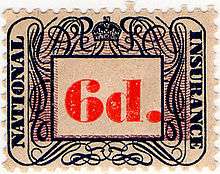National Insurance Act 1946
The National Insurance Act 1946 (c 67) was a British Act of Parliament which established a comprehensive system of social security throughout the United Kingdom.

Contents
All persons of working age had to pay a weekly contribution and in return were entitled to a wide range of benefits, including Guardian’s (or Orphans) Allowances, Death Grants, Unemployment Benefit, Widow’s Benefits, Sickness Benefit, and Retirement Pension.
Married women and a number of self-employed workers were not included under the schemes.
It followed the Ministry of National Insurance Act 1944 c. 46
Compulsory insurance against unemployment/illness paid by government, employer and worker contributions.
Significance
Nevertheless, according to the historian Kenneth O. Morgan, the Act constituted "a measure which provided a comprehensive universal basis for insurance provision that had hitherto been unknown".[1]
See also
- UK labour law
- Welfare state
- National Insurance Act 1911
- National Insurance Act 1965 (c 51)
- Social Security Contributions and Benefits Act 1992
- Timeline of pensions in the United Kingdom
References
| Wikimedia Commons has media related to National Insurance. |
- Taylor, David, Mastering Economic and Social History